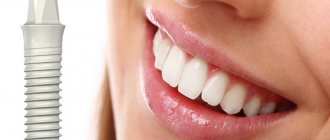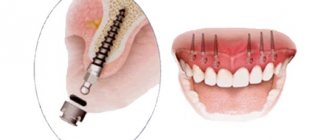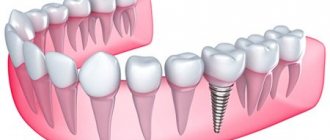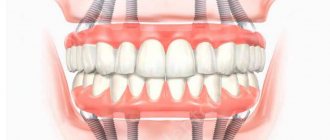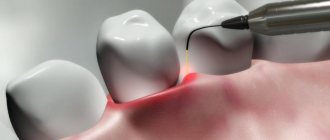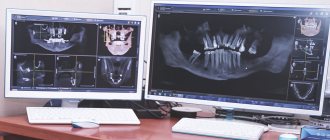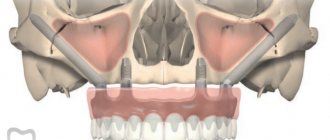863
The absence of one or more teeth is not only an aesthetic defect that brings many problems to people, but also a serious pathology that can lead to problems with the condition of the gums, temporomandibular joint and digestive organs.
To eliminate this defect in dentistry, many techniques have been developed, each of which is selected based on a specific clinical situation.
In the case of complete edentia of one or both jaws, a procedure called complex implantation is used, which allows you to restore the integrity of the entire dentition in the shortest possible time with minimal complications.
Consequences of complete edentia:
- serious speech disorders (indistinct pronunciation of sounds: d, z, l, n, t, h);
- changes in bite and facial contours;
- inability to fully eat, the patient’s diet changes to soft and liquid foods, many healthy foods are excluded;
- malnutrition affects the digestion process, leads to a lack of a number of substances in the patient’s body, and can also cause the development of various diseases of the gastrointestinal tract;
- problems with the normal functioning of the temporomandibular joint;
- development of deep wrinkles due to weakening of the soft tissues around the oral area;
- the development of psychological discomfort in society due to an unaesthetic smile and, as a result, an increase in depression.
Schroeder types:
- the first type is the most successful for prosthetics, since nothing prevents the fixation of the structure: it is characterized by high bone and gum (alveolar process), pronounced tubercles, a high palate and the place of attachment of the jaw muscles,
- the second type is characterized by an average degree of bone tissue atrophy: slightly pronounced tubercles, a palatal vault of medium depth, but with a sharp contraction of the muscles, displacement of the prosthesis may occur,
- the third type is not suitable for prosthetics, since significant atrophy of bone tissue is observed: the palate is flat, the height of the gums and bones is minimal. We can say that the alveolar process is absent and is compared to the sky.
Keller types:
- the first type is favorable for prosthetics: the alveolar process is high, smooth, the attachment of the facial muscles is high,
- the second type does not allow fixation of the prosthesis due to the short and narrow alveolar process, as well as the low point of muscle attachment. However, atrophy in this type is uniform, albeit sharp,
- the third type is characterized by pronounced atrophy of the bone structure in the lateral sections; in the area of the anterior teeth, the alveolar part is suitable for prosthetics and is clearly visible,
- the fourth type is the opposite of the third, since the bone is atrophied in the area of the front teeth, but is well defined in the lateral region.
The final stage of implants
During this period, a prosthetist and orthopedist will also work on implants. To decide on an implant, impressions of the jaws are taken, and a suitable design and color of the implant are selected. Then the implants are tried on and their final installation is carried out. When informing the patient about implants, the doctor will definitely warn about possible side effects of the procedure. Implantation, like any surgical intervention, requires subsequent compliance, for several days, with a gentle regimen that limits physical activity. Implants can also provoke mild local reactions: inflammation, fever. In this case, the doctor will prescribe appropriate therapy. Price of implants The choice between one or another implant, its design, form of attachment, material, will have a significant impact on the price of the procedure. But since the main advantage of this type of prosthetics is the almost complete replacement of natural teeth, the procedure will restore the health of not only the jaw, but also the body as a whole. By informing the patient about implants, the doctor chooses the best option, including focusing on the expected budget.
__________________________________________________________________________
Dental implantation (dental implants) in Moscow, Eastern Administrative District, Preobrazhenskaya Ploshchad metro station, st. Preobrazhenskaya, 6
Treatment of complete edentia
Complex dental implantation with immediate loading is currently considered a panacea for patients with complete edentia. As a rule, in the complete absence of teeth, bone tissue atrophy is observed, which can be caused by a long absence of load on the bone, jaw injury or infectious diseases. One way or another, in this case, the ability to install classic implants in the form of a screw is rarely possible.
With complex implantation, the doctor first selects a place to fix the implants, and then selects individual structures depending on the volume of bone in the specific location where the artificial root is installed. In case of bone tissue atrophy, the doctor uses special implants from the ROOTT BAZAL line, which involve the basal and bicortical sections of the bone. These sections are less susceptible to atrophy, so this type of implantation is also sometimes called basal. In addition, implants can be installed at an angle - this allows you to bypass areas with severe atrophy, using neighboring ones, and also achieve greater stability for the entire structure.
In total, from 6 to 10 evenly distributed implants are installed in the dentition. Restoring the entire jaw with ROOTT BAZAL basal implants will cost patients almost 2 times less than classic ones.
Basal dental implantation with immediate load is a new step in tooth restoration without long-term treatment - only 3-4 days. Many patients, due to the lack of material and time resources, refuse classical implantation - after all, this requires several months or even years of persistent treatment, and in some cases, additional surgical operations to build up bone tissue due to the lack of its volume (in In this case, there is no possibility of reliable fixation of the implant).
Complex implantation involves the selection of individual designs to restore a large number of teeth in a row - this technique will be especially interesting for patients with completely edentulous teeth.
Price
- Primary appointment (examination, consultation) with a dentist (special offer) 100001
For free
Promotion
- Dental prosthetics using an implant with a temporary crown using the laboratory method (PMMA) 152006
7 500 ₽
- Prosthetics of the entire jaw on 4 implants
149 900 ₽
Promotion
- SGS implant + turnkey crown
24 900 ₽
Promotion
- Osstem implant + turnkey zirconium crown
29 900 ₽
Promotion
- Astra Tech implant + turnkey zirconium crown
59 900 ₽
Promotion
- Nobel implant + turnkey zirconium crown
59 900 ₽
Promotion
- Straumann implant + turnkey zirconium crown
59 900 ₽
Promotion
One-stage implantation with immediate load (Immediate Load Implantation) is an express method for restoring lost teeth. In 1 day, the implants are installed and the prosthesis is fixed (maximum for 3 days). There is no need to wait for engraftment, as with a two-stage protocol. Hence the name - “single-stage” or “single-phase”. It is carried out for all types of edentia (from one tooth to a full jaw) subject to the requirements for the volume of bone tissue.
Complex implantation technology
ROOTT BAZAL basal implants differ from classic ones not only in size, but also in the type of thread (wider), as well as in a special coating. In addition, the structures are fixed in a special minimally invasive way, without trauma to surrounding tissues and with minimal damage to the bone, which significantly reduces the rehabilitation period after surgery. Like any implantation method, complex implantation consists of several main stages:
- identifying contraindications, studying the condition of bone tissue, sanitation of the oral cavity;
- development of an individual model of implant designs and places of their installation in the oral cavity;
- Implants are installed under anesthesia, and some elements can be fixed at an angle to stabilize the load when chewing with future teeth;
- implants are immediately combined with abutments, so fixation of permanent prostheses is possible already 3-7 days after their installation
Photos of the center’s work with complete edentia using basal implantation >
What technologies are used
Depending on the clinical characteristics, reconstruction of the dentition with complete edentia is performed in the following ways:
- Two-step protocol
Full implantation involves the implantation of 12-14 implants into each jaw, onto which artificial crowns are then fixed. Since bone tissue must be of good quality and sufficient volume to implement this protocol, this technology is suitable only for a few patients. In addition, the installation of 28 titanium supports and the same number of crowns is a fairly voluminous and expensive procedure, requiring about 20 visits to the implantologist.
- All-on-4 method
Modern technology, which involves the installation of only 4 implants in the jawbone (2 in the anterior section and 1 in the lateral sections), on which the orthopedic system is fixed. The all-on-4 protocol has its drawbacks, because the prosthesis is limited to 5 teeth and the 6th becomes suspended.
- All-on-6 concept
The “all-on-6” technique involves the installation of 6 implants (2 vertically in the anterior section and 2 each in the lateral sections at an angle of 40-60°). Implantation of the upper jaw involves the use of special zygomatic models installed in the strongest bone layers, avoiding areas with thin or loose bone and bypassing the maxillary sinuses. The use of 6 supports makes it possible to securely fix a full-fledged prosthesis on them for 14 artificial crowns. The technology allows you to do without bone grafting and achieve an anatomically correct location of the orthopedic system.
- Basal complex
The protocol involves the implantation of 8-12 basal implants, some of which are installed in the buttress areas, and some in the frontal zone. Multicortical fixation and the special design of the apical part of the implants provide increased initial stability of artificial roots, even with severe bone resorption.
Work examples
How often do you visit the dentist?
Features of full dental implantation
No more unpleasant surprises. Complete dentures are fixed to the implants using a special fastening system. The locks snap into place, and the orthopedic structure will not budge under any circumstances unless you want to remove it.
After a thorough diagnosis, complex dental implantation is performed in one appointment. Once the healing process is complete, the implants are fully integrated into the bone and become an integral part of the jaw. You can attach the prosthesis to the new “roots” one day after the procedure.
Complex dental implantation in Moscow can be done regardless of the patient’s age and in almost any situation. You can learn more about this directly at an appointment with dental specialists specializing in this area.
| Name | Clinic address | Service cost |
| ROOTT |
|
|
| Shandora | Moscow, Kolpachny lane, 6, building 4. | Implantation “All-on-4” - 300,000 rubles |
| Dentistry Grand Smile | Moscow, st. Miklouho-Maklaya 43 (metro station Belyaevo, Yugo-Zapadnaya, Kaluzhskaya) | Implantation of All-On-4 on a telescopic structure – from 190,000 rubles. |
| Dental center Empire | Moscow, st. Upper fields, 35, building 4 | Implantation system "Noris Medical" (Israel - from 195,000 rubles. System "Nobel" (USA-Switzerland) - from 300,000 rubles |
| Dentistry Mendeleev |
| All-on-4 (All for 4) with implants from 390,000 rubles per jaw |
With a “third” set of implant teeth, you will be able to eat, talk and laugh as if you had your own teeth. Implants will provide you with ideal comfort and confidence, which is impossible with classic removable prosthetics. Even if you still have a few natural teeth, but they are in poor condition, comprehensive implantation is the best solution to the problem.
Other jobs
How many implants are needed to implant the entire dentition?
To implant a jaw with complete edentia, a minimum of 3 implants is required (if we are talking about the lower jaw and a limited prosthesis). In other situations, the minimum number of implants implanted in the jaw is 4 pieces. The number and type of implants used are selected by the doctor strictly individually in each clinical case, after assessing all the most important parameters - the volume and type of bone tissue, the anatomical features of the jaw structures, general health, etc.
Average cost of full implantation in Moscow
Implantation in the case of complete absence of teeth in Moscow dentistry using the “all-on-4” technology for one jaw costs an average of 280,000 rubles, in the classical two-stage method – 450,000 rubles.
Examples of work “Before” and “After”
Restoration of all teeth on the upper and lower jaw - basal implantation
Case: partial absence of teeth on the upper and lower jaw, complicated by severe periodontitis (tooth mobility).
Complex one-stage implantation of the lower jaw
Case: there was a loose bridge of 4 front teeth on the lower jaw; after diagnosis, removal of the remaining teeth and coplex basal implantation were prescribed.
Restoration of all teeth in 4 days - basal implantation
Case: Absence of all healthy teeth on both jaws.
Restoration of all teeth using basal implantation method (March 2012)
Case: partial adentia, exposed roots of natural teeth, periodontitis, increased tooth mobility, severe atrophy of bone tissue in some places beyond the possible norms for classical dental implantation.
Features of the procedure
The duration of the procedure depends on the specific case. You can install an implant on one tooth in a day, spending several weeks on preparation. The number of visits to the dentist depends on the condition of the oral cavity. If the patient has caries, periodontitis, or other dental problems, or there is insufficient tissue at the implantation site, then it is necessary to visit the dentist more often before implantation. The cost of diagnostic and treatment procedures is proportional to their number and complexity.
Initial consultation
- Oral examination
- Making a treatment plan
- Drawing up a treatment estimate
For free
